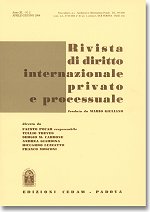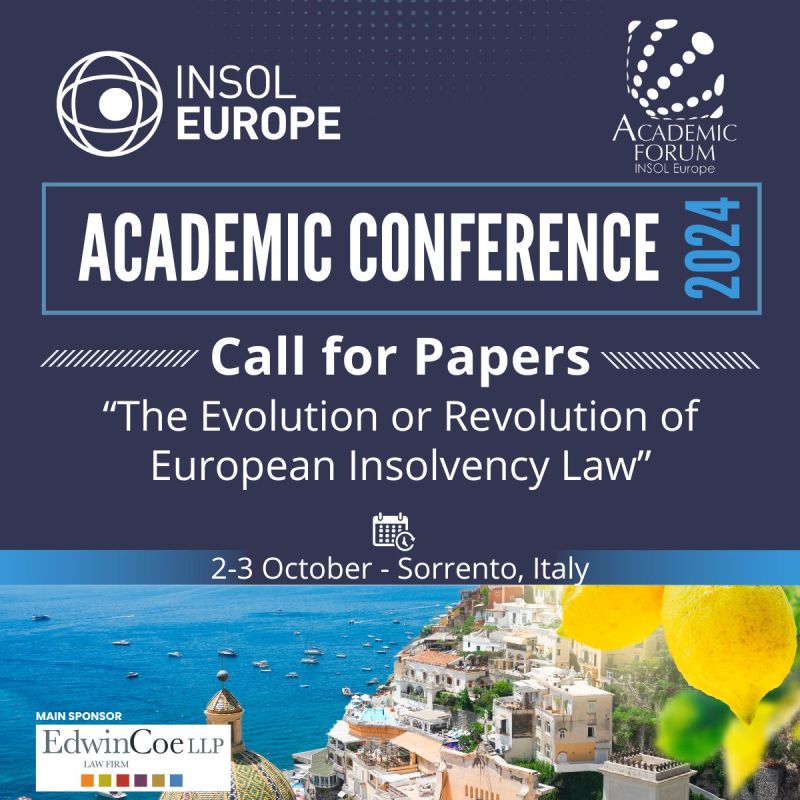(I am grateful to Prof. Francesca Villata – University of Milan – for the following presentation of the latest issues of the RDIPP)
The first and second issues of 2017 of the Rivista di diritto internazionale privato e processuale (RDIPP, published by CEDAM) were just released.
 The first issue features three articles, one comment, and two reports.
The first issue features three articles, one comment, and two reports.
- Franco Mosconi, Professor Emeritus at the University of Pavia, and Cristina Campiglio, Professor at the University of Pavia, ‘Richiami interni alla legge di diritto internazionale privato e regolamenti comunitari: il caso dei divorzi esteri’ (‘Effects of EU Regulations on Domestic Private International Law Provisions: The Case of Foreign Divorces’; in Italian).
This paper inquires whether Article 65 (Recognition of foreign rulings) and the underlying private international law reference are still applicable to foreign divorces after Regulations No 2201/2003 and No 1259/2010 replaced Article 31 of Law No 218/1995 and after the recent provision submitting the dissolution of same-sex partnerships to Regulation No 1259/2010.
- Peter Kindler, Professor at the University of Munich, ‘La legge applicabile ai patti successori nel regolamento (UE) n. 650/2012’ (‘The Law Applicable to Agreements as to Successions According to Regulation (EU) No 650/2012’; in Italian).
Under Italian substantive law agreements as to succession are not admitted. The same is true, inter alia, for French and Spanish law. The idea behind this rule is deeply rooted in the dignity of the de cuius. The freedom to dispose of property upon death is protected until the last breath and any speculation on the death of the disponent should be avoided. Other jurisdictions such as German or Austrian law allow agreements as to succession in order to facilitate estate planning in complex family situations. This is why the Succession Regulation (650/2012/EU) could not ignore agreements as to succession. Article 25 of the Regulation deals with the law applicable to their admissibility, their substantive validity and their binding effects between the parties. The Regulation facilitates estate planning by introducing the freedom of the parties to such an agreement to choose the applicable law (Article 25(3)). The Author favours a wider concept of freedom of choice including (1) the law of the State whose nationality the person whose estate is involved possesses at the time of making the choice or at the time of death and (2) the law of the habitual residence of that person at the time of making the choice or at the time of death. As to the revocability of the choice of the lex successionis made in an agreement as to succession, the German legislator has enacted a national norm which allows the parties to an agreement as to succession to establish the irrevocability of the choice of law. This is, according to the Author, covered by Recital No 40 of the Succession Regulation. The Regulation has adopted a wide notion of agreements as to succession, including, inter alia, mutual wills and the Italian patto di famiglia. The Author welcomes that, by consequence, the advantages of Article 25, such as the application of the hypothetical lex successionis and the freedom of choice, are widely applicable.
The Regulation did not (and could not) introduce the agreement as to succession at a substantive law level. It does not interfere with the legislative competence of the Member States. According to the author this is why member states such as Italy are free to consider their restrictive rules on agreements as to succession as part of their public policy within the meaning of Articles 35 e 40 litt. a of the Regulation.
- Cristina Campiglio, Professor at the University of Pavia, ‘La disciplina delle unioni civili transnazionali e dei matrimoni esteri tra persone dello stesso sesso’ (‘The Regulation of Cross-Border Registered Partnerships and Foreign Same-Sex Marriages’; in Italian).
With Law No 76/2016 two new types of pair bonds were regulated: civil unions between same-sex persons and cohabitation. As for transnational civil unions, the Law merely introduced two provisions delegating to the Government the amendment of Law No 218/1995 on Private International Law. The change is laid down in Legislative Decree 19 January 2017 No 7 which, however, has not solved all the problems. The discipline of civil unions established abroad is partial, being limited to unions between Italian citizens who reside in Italy. Some doubt remains moreover in regulating the access of foreigners to civil union in Italy as well as in identifying the law applicable to the constitution of the union, its effects and its dissolution; finally, totally unresolved – due to the limitations of the delegation – remains the question of the effect in Italy of civil unions established abroad between persons of opposite sex. With regard to same-sex marriages celebrated abroad the fate of Italian couples is eventually clarified but that of mixed couples remains uncertain; in addition, no information is provided as to the effects of marriages between foreigners.
In addition to the foregoing, the following comment is featured:
- Domenico Damascelli, Associate Professor at the University of Salento, ‘Brevi note sull’efficacia probatoria del certificato successorio europeo riguardante la successione di un soggetto coniugato o legato da unione non matrimoniale’ (‘Brief Remarks on the Evidentiary Effects of the European Certificate of Succession in the Succession of a Spouse or a Partner in a Relationship Deemed to Have Comparable Effects to Marriage’; in Italian).
This article refutes the doctrinal view according to which the European Certificate of Succession (ECS) would not produce its effects with regard to the elements referred to therein that relate to questions excluded from the material scope of Regulation EU No 650/2012, such as questions relating to matrimonial property regimes and property regimes of relationships deemed by the law applicable to such relationships to have comparable effects to marriage. This view is rejected not only on the basis of its paradoxical practical results (namely to substantially depriving the ECS of any usefulness), but mainly because it ends up reserving the ECS a pejorative treatment compared to that afforded to the analogous certificates issued in accordance with the substantive law of the Member States (the effects of which, vice versa, have to be recognized without exceptions under Chapter IV of the Regulation). The rebuttal is strengthened considering the provisions contained in Chapter VI of the Regulation, from which it emerges that, apart from exceptional cases (related, for example, to the falsity or the manifest inaccuracy of the ECS), individuals to whom is presented cannot dispute the effects of ECS.
Finally, the first issue of 2017 of the Rivista di diritto internazionale privato e processuale features the following reports:
- Katharina Raffelsieper, Attorney at Thewes & Reuter Avocats à la Cour, ‘Report on Recent German Case-Law Relating to Private International Law in Civil and Commercial Matters’ (in English).
- Stefanie Spancken, Associate at Freshfields Bruckhaus Deringer LLP, Düsseldorf, ‘Report on Recent German Case-Law Relating to Private International Law in Family Law Matters’ (in English).
*****
The second issue of 2017 of the Rivista di diritto internazionale privato e processuale features three articles and one report.
- Costanza Honorati, Professor at the University of Milan-Bicocca, ‘La proposta di revisione del regolamento Bruxelles II-bis: più tutela per i minori e più efficacia nell’esecuzione delle decisioni’ (‘The Proposal for a Recast of the Brussels IIa Regulation: More Protection for Children and More Effectiveness in the Enforcement of Decisions’; in Italian).
The present essay is a first assessment of the Proposal for a recast of the Brussels IIa Regulation (COM(2016)211). After a short explanation of the reasons for not touching on the highly controversial grounds for divorce, the essay develops on the proposed amendments in the field of parental responsibility and international abduction of children. It further analyses the amendments proposed to the general criterion of the child’s habitual residence and to prorogation of jurisdiction (par. 3) and the new provision on the hearing of the child (par. 4). Major attention is given to the new chapter on abduction of children, that is assessed into depth, also in regard of the confirmation of the much-discussed overriding mechanism (par. 5-7). Finally, the amendment aiming to the abolition of exequatur, counterbalanced by a new set of grounds for opposition, is assessed against the cornerstone of free circulation of decision’s principle. Indeed, new Article 40 will allow to refuse enforcement when the court of the state of enforcement considers this to be prejudicial to the best interest of the child, thus overriding basic EU principles (par. 8-9).
- Lidia Sandrini, Researcher at the University of Milan, ‘Nuove prospettive per una più efficace cooperazione giudiziaria in materia civile: il regolamento (UE) n. 655/2014’ (‘New Perspectives for a More Effective Judicial Cooperation in Civil Matters: Regulation (EU) No 655/2014’; in Italian).
Regulation (EU) No 655/2014 – applicable from 18 January 2017 – established a European Account Preservation Order procedure (EAPO) to facilitate cross-border debt recovery in civil and commercial matters. In order to give a first assessment of the new instrument, the present contribution aims at identifying the peculiarity that could make the EAPO preferable to the creditor vis-à-vis equivalent measures under national law. It then scrutinizes the enactment of this new piece of European civil procedure law in light of the principles governing the exercise of the EU competence in the judicial cooperation in civil and commercial matters as well as its compliance with the standard of protection of the creditor’s and debtor’s rights resulting from both the EU Charter of Fundamental Rights and the ECHR. Finally, it analyses the rules on jurisdiction as well as on the applicable law, provided for by the Regulation, in order to identify hermeneutical solutions to some critical issues raised by the text and clarify its relationship with other EU instruments.
- Fabrizio Vismara, Associate Professor at the University of Insubria, ‘Legge applicabile in mancanza di scelta e clausola di eccezione nel regolamento (UE) n. 2016/1103 in materia di regimi patrimoniali tra i coniugi’ (‘Applicable Law in the Absence of a Choice and Exception Clause Pursuant?to Regulation (EU) No 2016/1103 in Matters of Matrimonial Property Regimes’; in Italian).
This article analyzes the rules on the applicable law in the absence of an express choice pursuant to EU Regulation No 2016/1103 in matters of matrimonial property regimes. In his article, the Author first examines the connecting factors set forth under Article 26 of the Regulation, with particular regard to the spouses’ first common habitual residence or common nationality at the time of the conclusion of the marriage and the closest connection criteria, then he proceeds to identify the connecting factors that may come into play in order to establish such connection. The Author then focuses on the exception clause under Article 26(3) of the Regulation by highlighting the specific features of such clause as opposed to other exception clauses as applied in other sectors of private international law and by examining its functioning aspects. In his conclusions, the Author underlines some critical aspects of such exception clause as well as some limits to its application.
Finally, the second issue of 2017 of the Rivista di diritto internazionale privato e processuale features the following report:
- Federica Favuzza, Research fellow at the University of Milan, ‘La risoluzione n. 2347 (2017) del Consiglio di Sicurezza e la protezione dei beni culturali nei conflitti armati e dall’azione di gruppi terroristici’ (‘Resolution No 2347 (2017) of the Security Council on the Destruction, Smuggling of Cultural Heritage by Terrorist Groups’; in Italian).
Indexes and archives of RDIPP since its establishment (1965) are available on the website of the Rivista di diritto internazionale privato e processuale.




 The first issue features three articles, one comment, and two reports.
The first issue features three articles, one comment, and two reports.